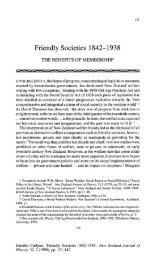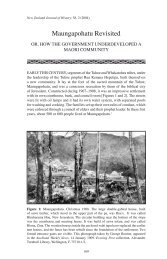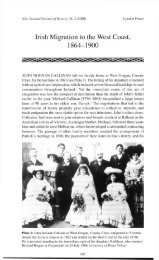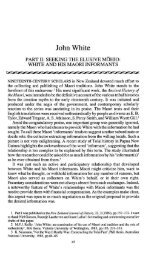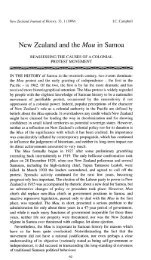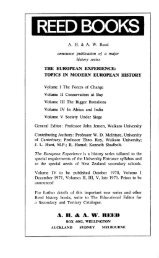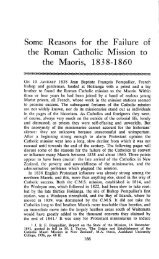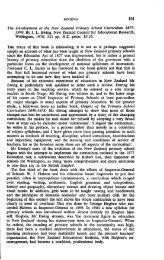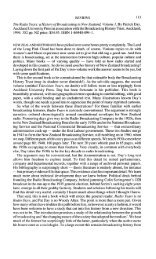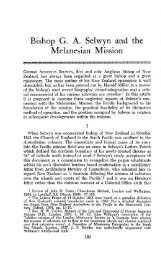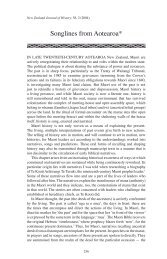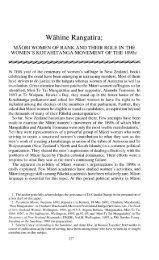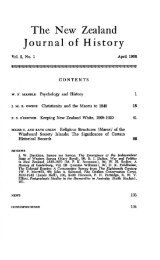Maori Oral Narratives, Pakeha Written Texts: - New Zealand Journal ...
Maori Oral Narratives, Pakeha Written Texts: - New Zealand Journal ...
Maori Oral Narratives, Pakeha Written Texts: - New Zealand Journal ...
Create successful ePaper yourself
Turn your PDF publications into a flip-book with our unique Google optimized e-Paper software.
MAORI ORAL NARRATIVES, PAKEHA WRITTEN TEXTS 27<br />
But it has also survived in other environments. The Maramatanga tradition<br />
within the Roman Catholic church, developed in the 1920s and 1930s and<br />
revived again in the 1960s, also retains systems of historical explanation<br />
which stem from a cosmology where the spirits of the dead, the wairua, are<br />
considered to be the media of communication between God and man.<br />
These ancestral spirits explain and direct 'history' for the living. 24 The<br />
Maramatanga faith is centred in Levin, north-east of Wellington. Its<br />
followers are active in <strong>Maori</strong> affairs at a national level. They 'are not<br />
marginal individuals, alienated from the mainstream of <strong>Maori</strong> society.<br />
Their ready access to all important currents, their central and pivotal positions<br />
cannot be ignored.' 25 They are considered important within the<br />
Kingitanga, and within the Ratana movement. Their iconography and their<br />
religious beliefs form a system whereby they manage to keep the <strong>Pakeha</strong><br />
domination at bay.<br />
This brings me back to the central problem for a Western historian.<br />
First, <strong>Maori</strong> oral history is not merely another source of information, nor<br />
even of perception. The purposes of the oral narrative tradition are to<br />
establish meaning for events, and to give a validation for the family's and<br />
the group's particular claims to mana and knowledge. Some pivotal family<br />
histories may develop as the hapu's structured histories. They will be told,<br />
for a purpose, on the marae. An awareness of the structuring of the oral<br />
narratives also makes one very aware of the responsibilities engendered in<br />
recording oral history.<br />
The primary responsibility must be to those with whom you have talked.<br />
It is their history. In the areas in which I have worked, individuals and<br />
families have allowed me to record some of it, because they share my view<br />
that recording is important. <strong>Maori</strong> history can then be communicated to<br />
<strong>Maori</strong> who no longer have access to it. I write here with an awareness of the<br />
positive responses among the Tuhoe and other <strong>Maori</strong> to a written history,<br />
based to a considerable extent on oral accounts, of Rua. 26 Secondly, the<br />
transmitting of <strong>Maori</strong> perceptions allows the colonizers to see the perspectives<br />
of the colonized — a necessary step so that the dominant culture<br />
changes its attitudes about its possession of 'truth'.<br />
The integrity of the various oral histories has to be retained when they<br />
are transmitted in a written form. These accounts are focussed quite differently<br />
from the linear history, or diachronic order, of the European<br />
historical tradition. Anthropologists have mostly tried to maintain the integrity<br />
of such world views by a synchronic approach. For the historian this<br />
is an inadequate approach, as it is for the anthropologist wrestling with the<br />
problems of cultural transformation. The contradictions in what constitutes<br />
history — oral and written — cannot be resolved. We cannot<br />
24 Karen Sinclair, 'Maramatanga: Ideology and Social Process among the <strong>Maori</strong> of <strong>New</strong><br />
<strong>Zealand</strong>', Ph.D. thesis, Brown University, 1976, p. 215.<br />
25 ibid., p. 166.<br />
26 Mihaia, 1979, 2nd ed„ 1987.



